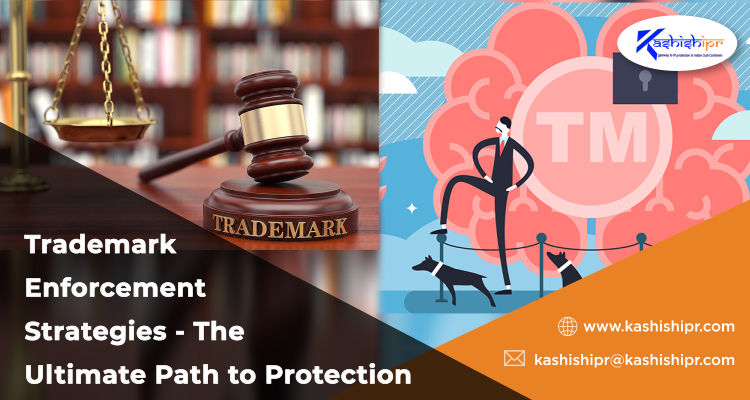
Trademarks provide multiple crucial advantages to businesses and customers alike. They validate the source of products or services. Additionally, they help the customers distinguish between brands and understand the quality of the products they buy. Trademarks also carry all the image and reputation a brand builds over the years.
The value of a trademark may be weakened or eventually lost in the scenario where its owner fails to safeguard or monitor the exclusive Trademark Rights in the marketplace. Furthermore, inconsistent or improper use of a trademark can obstruct its owner’s ability to enforce the trademark rights in a given brand. Even if you have the Trademark Registration in place, it is essential to understand that the trademark rights are not self-executing; being the trademark owner, you are ultimately responsible for monitoring the marketplace and your use as well to safeguard well against losing the rights. So, let us now make ourselves familiar with a few Trademark Enforcement strategies that every trademark owner must consider in his journey towards having adequate Trademark Protection in place.
- Have Proper Symbols of Trademark Registration & Ownership
If you don’t have a Registered Trademark in place but a good faith belief concerning you owning a mark exclusively, you should use the ‘TM’ symbol with your mark. It informs the customers that you consider yourself the mark’s rightful owner. If you have a registered trademark in place, you should use the ‘®’ symbol. In most cases, it is typically sufficient if the trademark symbol appears with one single prominent use of the mark in one single label or advertisement, even though the mark in itself may appear multiple times. It is imperative to keep in mind that the ‘®’ symbol should not be associated or used with unregistered trademarks. Additionally, it must not be used in association with products or services other than the ones defined in the trademark registration certificate. In case you wish to use the trademark with additional types of products or services, you should consider registering the mark concerning such additional types of products or services.
- Ensure Using Your Trademark as a Trademark
What needs your due attention is that a trademark should be used as an adjective and not as a verb or noun. Using a trademark as a verb or noun emphasizes that the term is common or generic instead of unique or distinctive. For safeguarding a trademark’s value, it is highly recommended to use the trademark as an adjective before whatever is the generic noun – for instance, Microsoft ® software. Moreover, the use of the term ‘brand’ following the trademark helps significantly in ensuring that the trademark does not become generic, for instance – Scotch ® brand tape. Another crucial aspect in this scenario lies in not using the trademarks in the plural or the possessive – for instance, it is Xerox photocopies, not Xeroxes.
Referring to your trademark as a verb or noun enhances its likelihood of becoming generic and eventually losing its trademark protection someday. It has already knocked out some widely recognized brands in the past, including Cellophane, Asprin, and Escalator. All these brands were once way too valuable and have now become only the generic descriptors of the concerned products or services.
- Monitor Infringing Uses of Your Trademark
To safeguard your trademarks adequately, you should track new trademark filings, online use, social media usage of marks, and domain names, which shall alert you to potential conflicts. You can efficiently use AI and algorithms to scan the web regularly for coming across instances of infringement. The same includes e-commerce marketplaces, standalone business websites, and social media channels. Additionally, with image recognition technology, you can conveniently spot your brand’s trademark design within online graphics and pictures.
- Send Cease-&-Desist Letters Automatically
What serves as the bread and butter of trademark enforcement is sending cease-and-desist letters. With automated trademark monitoring, you can send these letters when some specific conditions are met or when you send the green signal to enforce many infringers at once.
- Secure Social Media Handles & Domain Names Incorporating Your Trademark
Social media handles and domain names are usually available to the general public on a first-come, first-served basis. Therefore, brands and business owners should register their domain names and own the respective social media handles as soon as they register their trademarks. If in case you find out that your selected mark already exists as a registered domain name or social media handle, there are several alternatives or mechanisms that you can use to challenge the infringing use or obtain a transfer of rights; however, it is a lot easier to obtain the rights well in advance instead of having to chase them after someone registers your mark as a domain name or owns the same as a social media handle. Trademark owners should get in touch with Trademark Attorneys to explore the best possible strategies for acquiring and challenging third-party registration of social media handles and domain names incorporating their valued trademarks.
Bottom Line
In the ongoing highly competitive business environment, a brand name means everything. Once you have a registered trademark in place, you must put in a genuine effort to safeguard it at all times. With an all-inclusive trademark monitoring solution, trademark enforcement can prove to be much easier and quicker.
The experts at Kashishipr can help you enforce your trademark rights and keep your business secure. Get in touch with us at kashishipr@kashishipr.com to discuss your trademark enforcement requirements! 👉 ✅ For view-source: https://www.kashishipr.com/
No comments:
Post a Comment